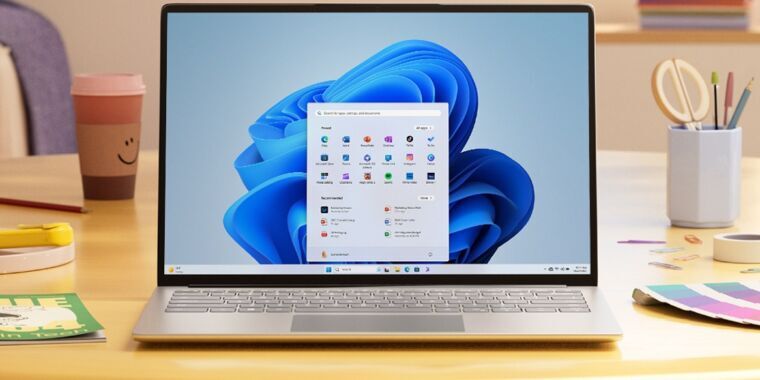While they are at it, can we get Prism for Linux?
We have Box64
And fex
not hw accelerated
I’m not sure that means anything. For it to be hardware accelerated you would need a amd64 cpu
both apple m cpus and snapdragon have hardware magic to make translation viable when paired with usermode tools like Rozetta or Prism
otherwise it’s painfully slow, as demonstrated by both box64 and fex.Do you have a source for that? It seems like that would defeat the purpose of using ARM.
What Apple did for Macs when switching architectures, though, was to port their own software to the new architecture. Microsoft doesn’t even port fucking Minesweeper to ARM.
Isn’t that the point? This new layer is supposed to make it easier to port everything, and they’re saying that’s what Rosetta did for Apple/Mac.
Isn’t that the point?
No, the point of Rosetta was to be a stop-gap for 3rd party software because Apple did all porting in-house software long ago.
Prism is Microsoft’s tool for staying lazy. Microsoft ships ARM-based Surface tablets since 12 years!!!
In all architecture transitions (PPC->Intel then Intel->ARM), Apple Chess has always been a native port from day one.
I firmly maintain that if Microsoft gave a shit about ARM, they would be defaulting every one of their compilers to produce fat x86/aarch64 binaries. The reality is, however, that they don’t care about the hardware so long as it is good enough.
if Microsoft gave a shit about ARM, they would be defaulting every one of their compilers to produce fat x86/aarch64 binaries
Wasn’t the point of .NET once that native binary code isn’t needed? I’d say if Microsoft gave a shit about ARM, everything would have been ported to .NET.
Translation layers aren’t porting
Fair enough, but to the end user it doesn’t matter if it works.
to the end user it doesn’t matter if it works.
Emulation is always slower and eats more battery. Microsoft’s laziness is proof they don’t care about that hardware, so may just as well buy an iPad Pro instead.
Its not laziness, they have lost developers support over time and lets be honest here, Windows 8 arm was roundly laughed out the door. Expectations are now marketing hallucinated by copilot.
This is typical Microsoft “agile”: minimum effort and delivery.
Not porting simple stuff like Minesweeper is definitely laziness on Microsoft’s part.
Emulation is almost always slower and eats more battery.
FTFY. There have been some cases where emulation actually outperforms native execution, though these might be, “the exceptions that prove the rule.” For example, in the early days of World of Warcraft, it actually ran better on WINE on Linux than natively on Windows.
For example, in the early days of World of Warcraft, it actually ran better on WINE on Linux than natively on Windows.
WINE literally stands for “WINE Is Not an Emulator”.
This is a pretty interesting counter example: https://www.eteknix.com/running-yuzu-on-switch-gives-you-better-performance-than-native-gaming/
But, as others have said, exceptions confirm the rule.
To add to what the other person said, there are some Windows-only games even today that run better on Linux than on Windows (I don’t have examples off the top of my head.)
Wine is not CPU emulation.
this is for the transition. no point in porting your software if nobody has the hardware. This will get people to get the hardware, as they can just keep using the existing software, and wait until it’s properly ported
Apple released a native x86 version of Tiger with their first Intel Macs.
Sure, but the vast majority of Mac software at the time, including loads of first applications from Apple, couldn’t run on Tiger. You had to run it in the “Classic” environment - and they never ported that to Intel.
Tiger shipped just 4 years after the MacOS 9.2 and plenty of people hadn’t switched to MacOS X yet.
The reality is Apple only brings things forward when they can do it easily.
Apple has done eight major CPU transitions in the last 40 years (mix of architecture and bit length changes) and a single team worked on every single transition. Also, Apple co-founded the ARM processor before they did the first transition. It’s safe to assume the team that did all those transitions was also well aware of and involved in ARM for as long as the architecture has existed.
Microsoft really never do that port if they have a translation layer
No, this won’t get people to get hardware that looks horribly slow because everything needs to run through a translation layer. They do have the sources. They could just recompile them for the new hardware. If their sources are not total crap.
I’d expect there’s quite a lot of assembly and endianness-dependent stuff here and there. It’s Microsoft. Their culture is about pride of things being arcane-complex inside, cause if you can untangle that, you are a good programmer. They think that. I think they think that. Maybe they are just vile.
Windows NT historically ran on lots of CPU architectures, PowerPC, MIPS, Alpha, Itanium, etc, and that included the bundled software like 3D Pinball. I would have expected it to still be quite portable.
You may be spot on with that. Though the assembly part can be fixed by code translation at compile time. Endianess and shitty programming habits are another thing that the cross-executor must deal with, too, so maybe this has been covered already. Or it will blow up in their faces, anyway.
Nobody will buy the hardware if they can’t commit to supporting the software. In a previous role, I was responsible for advising purchasing decisions for my company’s laptop fleet. The Surface X (Arm edition) looked cool, but we weren’t willing to take the risk, because at the time Microsoft had far worse transitional support than they do now. It’s gotten better, but no one in their right mind is going to make the kind of volume purchases that actually drive adoption until they demonstrate they are in it for the long haul. It’s a chicken and egg problem, and Microsoft doesn’t care what hardware you are using, so long as it is running Windows or using (expensive) Windows services.
What better way to sell devices than by halfassing them to oblivion?
Another thing they did is add hardware support for the x86 strong memory model to their ARM chips, allowing for efficient emulation. Without this, translated code takes a big performance hit.
Did Qualcomm add something similar to their ARM CPUs ?
They’ve still got things that haven’t changed since about Windows 3.1, like that ODBC dialog window.
One of the biggest problems I had with windows on ARM was drivers. Most of my devices that needed drivers didn’t have an arm compatible version available. This needs to change more urgently than simply being able to run software, for me, at least.
What drivers?
Most importantly, my soundcard. But also my graphics tablet.
On a ARM device? Wouldn’t the device be made for ARM compatibility?
External devices I presume
Yes, that’s right. Of course, ms shipped a device with drivers for its own hardware.
But most devices I plugged in, that needed drivers, had problems installing.
…It took them only 4 years to follow the leader this time.
It has more to do with manufacturers than Microsoft. Nobody was making high performance ARM chips, so there was never a market for windows on ARM until now
I don’t really know if ARM adds benefits I’d really notice as an end user, but it’ll be interesting to see if this really goes through and upends the dominant architecture we’ve seen for really 40+ years.
You will definitely notice better battery life as an end user.
The idea is ARM can be more efficient, which translates as longer battery life and/or faster computers for the end user.
The benefits, basically, are that it can provide an architecture that is designed for modern computing needs that can scale well into the future. That means high performance with low power consumption and heat.
The x86/64 model has been up against a wall for a while now, pumping out red-hot power hogs that don’t suit modern needs and don’t have much of a path forward wrt development compared to ARM.
I give ARM a decade before RISC-V eats it from the bottom up
now we need some sort of hw-accelerated x86_64 layer but for linux
Isn’t there already Box64/Box32? Not to mention most Linux software is already compiled for ARM thanks to being open source.
yes, but you’ll be missing out on ALL games, none of which are compiled for arm64.
also no, box64 is not hardware accelerated. both snapdragon and apple m series cpus have hardware magic that makes translation viable at all (as demonstrated by box64’s (and even fex) piss poor performance)
I don’t see this working. The reason that Apple and ARM work is because Apple controls the whole ecosystem on Macs.
I can hear the game launchers laughing. If EA doesn’t have a native version of their app out, that should be every reviewers first test.















